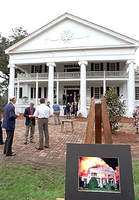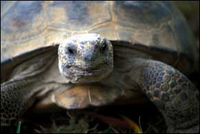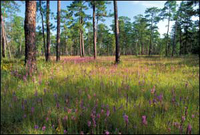Description of Thomasville, Georgia, location of Payne's winter estate
In his later years, Oliver Hazard Payne maintained a winter home in Thomasville, Georgia, a town that gained a reputation for winter retreats for hunting and fishing for many of the barons of the gilded age, including John D. Archbold of Standard Oil and Harry Davidson of the Morgan group who spent a year recuperating in 1920 at Magnolia Plantation, his estate in Thomasville. Colonel Payne willed his Thomasville property to Payne Whitney, one of his favorite nephews. Later it became the property of John Hay Whitney, the son of Payne Whitney and Helen Hay Whitney.
THOMASVILLE -- The lime-hued mansion that has hosted President Eisenhower and Jacqueline Kennedy among its guests has been restored to antebellum artistry.
The Greenwood Plantation, one of the best-known homes of the region before a 1993 fire ravaged it, now has a brandnew exterior. Even the magnolia blossom adorning the top has more pluck.
"This is almost precisely what it was," said Terry Blanchard, business manager for the family that owns Greenwood.
Greenwood was built as the center of a cotton plantation around 1835-40 and acquired in 1899 as a hunting estate by Col. Oliver Hazard Payne. The family of one of his descendants, John Hay Whitney, has had the house for almost 100 years.
An electrical fire gutted the historic mansion in April 1993, shortly after the house had been redecorated.
"People were stunned," said Kate Whitney. "You felt like a piece of your heart had been burned."
"What you see now is a first-class job, a blue-ribbon job," she said when the house was unveiled last month.
The Whitney family announced plans last year to rebuild the mansion's roof and outer walls. The project developed after consultation with the Georgia Trust for Historic Preservation.
Henry H. Lewis Contractors Inc. of Baltimore -- the company that worked on Thomas Jefferson's Monticello estate -- took charge of the exterior preservation. Bracey Lumber Co. of Thomas County completed the mill work, a complicated task that involved careful analysis of drawings of the home to get accurate measurements for century-old beams.
The inside of the famous plantation still shows scars of the 1993 fire, but no decision has been made yet on restoring the inside.
"You can't tell anything has ever happened to the house," said Thomasville Mayor Camille Payne. "It will give locals so much satisfaction to know something of so much beauty has been restored."
Key dates in the history of Greenwood Plantation, located near Thomasville in south Georgia:
- 1835-40, builder Tom Jones completes construction of the cotton plantation's Greek Revival mansion
- 1899, Col. Oliver Hazard Payne buys Greenwood as a hunting estate
- 1950s, President Eisenhower visits on a hunting trip as a guest of John Hay Whitney, a descendant of Payne who served as ambassador to Great Britain in the Eisenhower administration
- 1963, Jacqueline Kennedy spends a week in seclusion at the house following the assassination of her husband, President Kennedy
- 1993, fire guts the historic house
- 1996, restoration project begins
- 1997, restored exterior unveiled
- 2002, Nature Conservancy awarded management
The Nature Conservancy and Greenwood Plantation
The Nature Conservancy in July 2002 was awarded management of the historic Greenwood Plantation in Georgia. The 5,200-acre plantation is one of the most ecologically significant privately-held properties in the southeastern U.S. due to an extensive collection of unspoiled old-growth longleaf pine.
- Size: 5,200 acres
- Location: Thomas County, Georgia
- Animal Species: Red-cockaded woodpecker, pine snake, gopher tortoise, Bachman’s sparrow
- Plant Species: wire-leaf dropseed, yellow fringeless, snowy orchids, Turk’s cap lilies
Ecological Importance: Located in southwest Georgia's Red Hills, the Greenwood Plantation contains a 1,000-acre old-growth section of longleaf pine known as the "Big Woods," with trees ranging in age from 200 to 500 years old. Once covering more than 90 million acres across the Southeast, less than 3 percent;of the original longleaf pine forests remain. This ecosystem support a diverse range of globally imperiled species. The plantation also contains river frontage along the Ochlockonee River, river slope forests, a longleaf pine sandhill, and ponds and fields. (Pictured above: Gopher tortoise.)
History: Oliver Hazard Payne purchased the property in 1899, and left the Plantation to his nephew, "Plain" Payne Whitney. When the latter died in 1927, the estate passed to his widow, Helen Hay, daughter of the Lincoln biographer, John Hay. Her son, John Hay Whitney, inherited Greenwood Plantation in 1944 and worked with pioneering foresters Ed and Roy Komarek, Herbert Stoddard and Leon Neel to manage the forest while preserving the integrity of the ecosystem. Their techniques of prescribed burning and sustainable forestry resulted in the special character and ecological value of this property today. John Whitney’s wife, Betsey, donated the property upon her death in 1998 to the Greentree Foundation, which Mrs. Whitney established in 1982 after the death of her husband.
Partners: The New York-based Greentree Foundation supports charitable, educational and scientific programs. Pictured at right: Longleaf pine with blazing star flowers.
Plans: Through an adaptive management plan developed with the Greentree Foundation, The Nature Conservancy will work to conserve and protect Greenwood as the highest quality example of a longleaf pine wiregrass ecosystem in the Red Hills and the East Gulf Coastal Plain Ecoregion. After one year, the Foundation expects to transfer title to the Conservancy
References:
The above information is taken from two websites about Thomasville:
www.rose.net and www.thomasvillega.net
Information about Greenwood taken from websource: www.athensnewspapers.com/1997/110497/1104.a2mansion.html
Info about Nature Conservancy role may be found on the website http://nature.org/success/greenwood/html/
Marist University | Marist Archives & Special Collections | Contact Us | Acknowledgements


